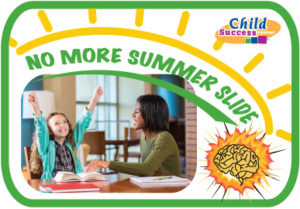CSC Blog
Tips for Managing the Homework Routine
Taking the Stress Out of Homework
Most parents have experienced it – the daily after school battle to get their kids to sit and do their homework. There are so many distractions – TV, social media, phone apps, texting. The problem often becomes worse if a child is struggling in school to begin with.
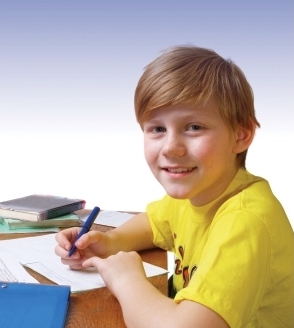 Providing a child with a sense of control over his homework situation can help. Creating a visual schedule and a “to do” list creates a feeling of ownership of a set of tasks. Completing this list of tasks instills self-confidence and a feeling of capability and accomplishment.
Providing a child with a sense of control over his homework situation can help. Creating a visual schedule and a “to do” list creates a feeling of ownership of a set of tasks. Completing this list of tasks instills self-confidence and a feeling of capability and accomplishment.
Establish a set time for homework, after some quality movement time, and keep it consistent, helping to build the child’s internal sense of time. Organization is critical. Set aside a special place in the house for homework. Make sure this location is kept tidy and that all needed materials, pens, pencils, etc., are available. If a child is older, they can organize their own materials, helping to build executive function skills. Make sure the child is sitting at a desk that is appropriate for their body. Their feet should be flat on the floor or step stool, keeping their ankles and knees at 90 degrees. Shoulders should not be elevated and elbows should be at 90 degrees for proper ergonomic positioning. If a child is looking at a computer screen, his eyes should be looking at the center of the screen. Having to look up or down for a prolonged period of time can cause neck fatigue.
If a child struggles to keep track of homework assignments and related papers, creating a homework folder that goes back and forth with them to school can help. Making the teacher aware of this kind of folder means that everyone is working together on behalf of the child, with the ultimate goal of helping the child become independent with homework tasks.
Breaking up the homework time with a fun, healthy, crunchy snack wakes up the brain, helping to keep your child alert and on task. When a child is frustrated it is important for him to see that the parent or caregiver does not lose trust or sight of the end goal – completion of the task and success for the child. A parent or caregiver’s availability during the homework period can be beneficial to a child that is struggling, providing a wonderful opportunity for a parent or caregiver to help motivate the child to develop resilience, focus and perseverance when challenged. Joining the child on a walk outside or a card game during a break can provide an opportunity for the child to communicate difficulties he may be having.
Encourage children to read for 30 minutes a night. Be aware of visual distractions, sound or auditory distractions, and get the child to work with you to locate a physical space that helps their body feel calm and their mind focused. Set a timer so they experience the success of completing the task. Big beanbag chairs are often a great place for children to feel calm. Make sure the lighting is adequate to avoid eye strain. If a child is rubbing their eyes, blinking consistently, has watery eyes or is regularly losing their place on the page, a developmental optometry assessment may be required.
Parents should try to remember that homework is for practice. It allows a child’s teacher to know how a child is doing with his learning. It is important that a parent, who feels that his child doesn’t understand what is being asked of them or is struggling in some way, communicate that to the teacher. Resist the urge to do a child’s homework for them – it’s not helpful in the long run.
If a child seems to be consistently struggling at school or with independent homework, then seeking out a professional assessment with an Educational Therapist could be key to identifying a child’s particular learning style, strengths and weaknesses.
Why Your Child May Need Educational Therapy
How Educational Therapy Helps a Child That is Struggling to Learn?
We all expect and hope that our child will have a love of reading and learning. It is heartbreaking for a parent to see their child struggling to learn. Often, however, a parent is uncertain what is getting in the way of their child’s ability to learn. After all, children are natural learners, right? Yes…and no.
 In the very early years from birth to 3 years old, a child’s learning rate is the fastest of their lifetime. As a child grows older, however, he may find himself in a learning environment that doesn’t necessarily suit the way he learns best. While it may be natural to learn, not every child learns in the same way. If a child’s learning style is not recognized and difficulties in learning are not addressed, as he falls behind his peers the child can lose confidence and self-esteem, which will in turn further decrease his desire to pursue learning and may result in behavior issues. Early intervention is key and it is vital that the child be given access to a safe space to gain insight into their own particular way of learning and develop the skills needed for successful learning.
In the very early years from birth to 3 years old, a child’s learning rate is the fastest of their lifetime. As a child grows older, however, he may find himself in a learning environment that doesn’t necessarily suit the way he learns best. While it may be natural to learn, not every child learns in the same way. If a child’s learning style is not recognized and difficulties in learning are not addressed, as he falls behind his peers the child can lose confidence and self-esteem, which will in turn further decrease his desire to pursue learning and may result in behavior issues. Early intervention is key and it is vital that the child be given access to a safe space to gain insight into their own particular way of learning and develop the skills needed for successful learning.
Educational therapy provides personalized remedial instruction to a child with learning and attention challenges that may be connected to root causes such as dyslexia, dyscalculia, dysgraphia, ADHD, executive function deficit, and language, visual and auditory processing issues. Other circumstances to take into consideration might be a child’s regulatory system, sensory experience, emotional involvement, social connectedness and reciprocity, executive functioning, attention, and frustration tolerance. Educational therapy demystifies learning problems, enables a child to build underlying learning skills and stimulates a child’s self-awareness of his strengths so he can use them to his best advantage to overcome or compensate for areas of weakness.
We continue to learn our entire lives. Learning and attention issues don’t go away, but educational therapy will teach your child new learning strategies that will help him improve concentration, memory and attention, and be a more successful, self-confident and efficient learner in school and all through his life.
How Can My Child Learn Social Skills?
Social brain building to become a “we thinker”, a successful group participant and a friend, is one of the hardest jobs of childhood.
Weather your child is 4, 10 or 15, being a competent social learner does not always happen intuitively. Learning social skills will require that your child is able to attend to a lot of data and decide what are the most important pieces of information, and use emotion, language and motor skills to respond in an appropriate manner within a relationship. A child can acquire those tools when he/she is given the opportunity to experience interactions with others that result in positive and negative outcomes, and is supported throughout the learning process. These learning opportunities can be facilitated by informed, knowledgeable and compassionate mentors, including parents, teachers and therapists. They can bridge the gap for the child and help him build the “scaffold” needed to move to higher learning.
It is often confusing when we see a child, of any age, struggling. We often think first about the psychology behind the child’s temperament and behavior – does it stem from environment, living situation, relationships? In reality, learning to be a social being and be socially competent is really based on a highly complicated neurological process – a process that is automatic for most and creates stress and struggle for some.
Social learning relies heavily on foundations in development that have been put in place to regulate how the brain perceives and processes incoming sensory information, and how it then organizes and delivers an output that is expected and connected, resulting in a positive social outcome. The Social Thinking® (Attributed to Michelle Garcia Winner as creator of the Social Thinking Methodology)Social Competency Model, shown here, uses an iceberg as an analogy. The visible part of an iceberg and what we see above the water, represents the things we can see people do, such as their social skills and behaviors. Yet the entire iceberg is much bigger than that, having a large foundation that goes far and wide into the depth of the sea, correlating to the knowledge, experience and development we hold – the collective information we draw upon and use to interpret and respond to social information that we experience.
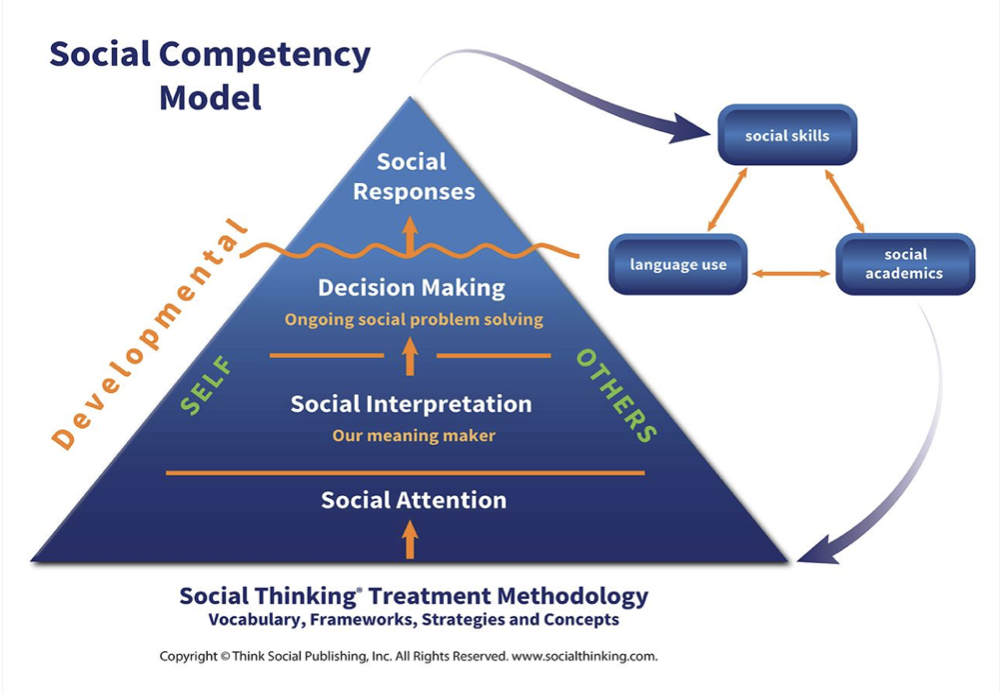
As parents, we unknowingly assume our child inherently owns the skills to be a social thinker and adapt collaboratively in any environment. We think that our child’s social learning will just happen on its own.
The fact is that up to 20% of children will struggle with the jobs of childhood due to underlying processing challenges stemming from brain development. They may or may not have functional development and or learning challenges that lead to a diagnosis of speech and language disorder, sensory integration dysfunction, ADD, autism etc. These children are at risk for social challenges often due to their individual processing challenges. Finding a team of professionals, (Occupational Therapist, Speech Therapist, child psychologist) who can identify why your child struggles is the first step to creating a plan on how to build their base of social development.
Red flags that your child might be struggling to build friendships and to develop social skills:
- Prefers to play alone and does not play interactively with other children
- Difficultly understanding how to gain attention appropriately
- Difficulty initiating interactions
- Difficulty staying on topic during conversations
- Difficulty making relevant comments during conversations
- Difficulty following game rules
What types of therapy help a child develop social skills?
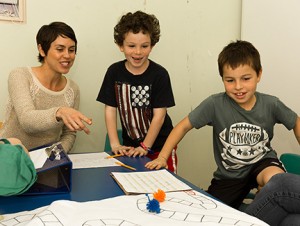 During a child’s time as a pre-schooler, an Occupational Therapist can determine if sensory and/or sensory motor processing challenges exist. The OT can also determine if a child is having difficulty with self-regulation, joint attention and intention for a shared play experience. A Speech Therapist can work with a child with language processing issues, and a “peer to peer” or “social brain building” group can be facilitated by both OT’s and ST’s to teach concepts such as collaborative play, cooperation and negotiation.
During a child’s time as a pre-schooler, an Occupational Therapist can determine if sensory and/or sensory motor processing challenges exist. The OT can also determine if a child is having difficulty with self-regulation, joint attention and intention for a shared play experience. A Speech Therapist can work with a child with language processing issues, and a “peer to peer” or “social brain building” group can be facilitated by both OT’s and ST’s to teach concepts such as collaborative play, cooperation and negotiation.
In elementary school, a Speech Therapist can determine a child’s level of receptive and expressive language, auditory processing abilities, and his use of social-pragmatic language. If language processing and sensory/sensory motor integration issues have been ruled out, small groups facilitated by a psychologist, are helpful in honing a child’s emotional and attention regulation skills.
At Child Success Center, once a therapist has made an assessment and determined the root of a child’s social struggles, then a recommendation is made for the “right fit” therapy.
Options include:
- Individual Occupational Therapy and/or Speech Therapy: One child working with one therapist as part of OT session or collaborative session with ST, with opportunity for peer to peer play experiences in our sensory motor gym to build foundational social skills.
- Paired Peer Speech and Language Sessions: 2 children who have been matched for optimal outcome success, working with a Speech and Language Pathologist.
- Friendship Club: Small group of 4-6 children matched for group skill building needs utilizing social thinking and supporting inside out social emotional development- Led by psychologist.
Ultimately, we want our children to be able to relate to other people’s feelings and to experience a sense of belonging in their classrooms, homes and community. With a solid foundation of social skills, any child can be the key to his own success.
Learn more about Social Learning Programs, peer-to-peer play, and Friendship Club at Child Success Center
This program, including its teacher or leader, is not affiliated with, nor has it been reviewed, approved, or endorsed by Michelle Garcia Winner and Think Social Publishing, Inc.
Executive Function – the Key to Success
Executive Function – Helping Your Child Create the “Recipe for Success” this School Year.
Melissa Idelson, Director of Child Success Center, recently spoke at the Child Success Foundation’s “Outside the Box” Child – Educational Conference in Culver City, California. She and her speaking partner, Dr Jayme Neiman-Kimel, Ph.D, shared their thoughts on how to help children who struggle with Sensory Processing Disorder (SPD), attention issues and lack Executive Function skills, organize their worlds, learn to self regulate and develop the skills needed to move towards independence.
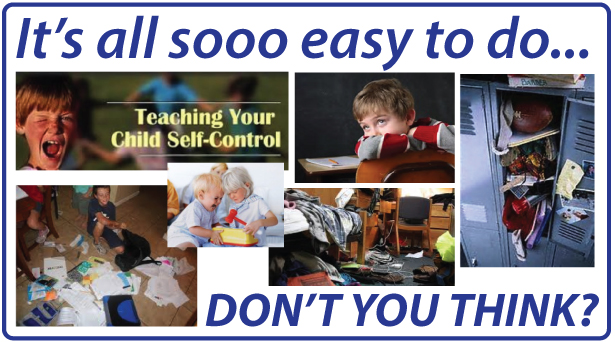
Children with SPD, ADHD and Executive Function deficit may exhibit similar behaviors such as impulsivity, frustration, biting/pushing/hitting, difficulty going to school or maintaining friendships, immaturity, sleep difficulties, poor personal space recognition, and may be hard to parent. Any of these behaviors can hinder your child from effectively doing his “jobs of childhood” – that of learning to collaborate his physical, social/emotional and communication/language platforms with his environment and peers in order to prepare his brain for a higher level of learning. This collaboration, known as Executive Functioning, is a set of processes, or neurologically-based skills, that all have to do with managing oneself (mental control and self-regulation) and one’s resources in order to achieve a goal.
While we tend to assume that all children are born with the capacity to excel in the “jobs of childhood”, the reality is that about 20% will encounter challenges substantial enough to require intervention – and the earlier the better. Getting this early intervention begins with parents being aware of their child’s challenges and seeking professional assessment.
The recipe for success begins with an intake session with a professional to determine the “ingredients”, or the challenges the child is experiencing, and the behaviors the child is exhibiting. Then an assessment is made and a program of appropriate interventional therapies with a therapeutic specialist is created. From these therapy sessions the child will acquire the tools needed for a successful outcome.
For the preschool aged child, a combination of occupational therapy and speech therapy is often recommended. For older children, educational therapy can be added to the mix, utilizing a team based/whole child approach. Social Learning, a program for all age groups used here at Child Success Center, provides practical frameworks, strategies, activities, and vocabulary to help improve social skills.
Learning Executive Function skills is a process that begins in the pre-school years. It is important that parents observe their young child and take notice of areas where there is consistent difficulty. However, during any stage of a child’s development, if a parent notices signs of struggle or frustration, that is the time to seek an appropriate assessment.
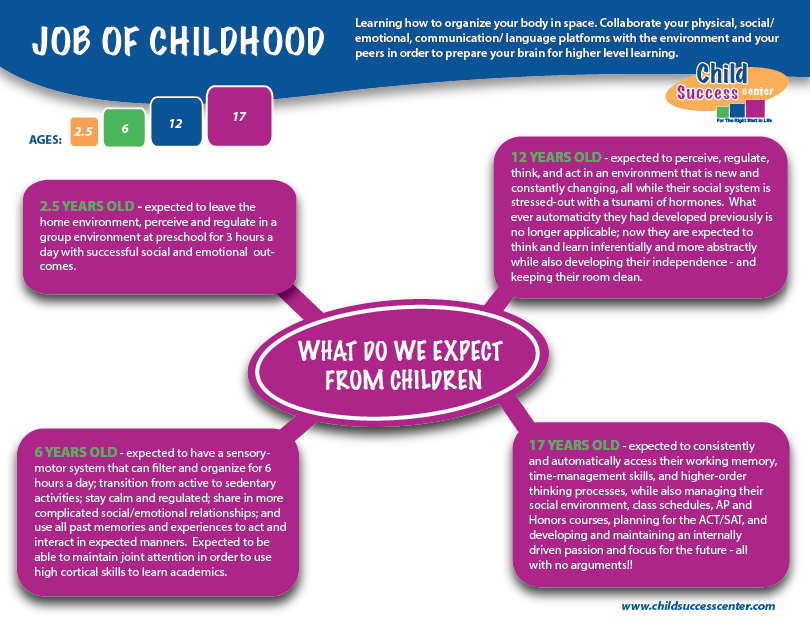
Learn more about what to look for in your child, how each of the therapies are facilitated, the programs offered at Child Success Center, and how we can help your child achieve his successful outcome.
Occupational Therapy – Learning the “Jobs of Childhood”
Which Children Benefit from Therapeutic Services?
Friendship Club Social Skills Enrichment Program
Choosing a Halloween Costume for the Sensory Child
 The wrong Halloween costume can create a scary Halloween for the sensory child.
The wrong Halloween costume can create a scary Halloween for the sensory child.
For the sensory child, everyday encounters involving touch can become a monumental issue. An over or under sensitivity to touch and texture can make eating, showering and getting dressed a real challenge.
This challenge can make the annual choosing of a Halloween costume a frightening event. The sensory child may find the myriad textures of super hero and monster costumes just too intolerable and uncomfortable due to tactile sensitivities. One child may prefer a loose fitting costume – another, something that fits snugger. Sometimes seams or tags are the culprits. Evaluate what your child is comfortable with for his everyday attire then seek costumes that fit those criteria.
Something else to consider is the time and place where your child tries on his costume. Children with tactile sensitivities are often in a state of hypersensitive alertness and high arousal. Try on Halloween costumes at a time when the child is calm and without agenda.
Perhaps wearing familiar, comfortable clothing under their costume might be the easiest fix when the “perfect” costume isn’t perfectly comfortable. Washing the costume before wearing and a trial run may also be beneficial to ensuring a successful and happy “trick-or-treating” experience.
And in case all those precautions fail at the last minute and your child’s first choice costume just isn’t working out, prepare to have a “backup” costume made from your child’s tried and true favorite clothing. Being prepared helps keep the situation light and everyone smiling.
Happy Halloween!
Preventing Summer Slide
Help your child avoid “summer slide” with some fun summer learning.
Summer slide, unfortunately doesn’t refer to that cool new apparatus on the playground. Summer slide is what happens when students forget academic skill sets over the summer break. In fact, statistics show that a child can lose up to 30% of their math and reading abilities, putting them behind about 2 years by the 5th grade.
Now while that sounds dramatic, it is also avoidable. The summer is meant to be a fun break from the rigors of academia, but there is much learning that can be accomplished during summer fun and down time, leaving your child ready to tackle the beginning of a new grade in the Fall.
Some children naturally love to read, and will find the time during the summer to relax with a good book. Other children who may have reading challenges, and therefore don’t really enjoy it, can benefit from a reading skills program, where highly trained educational therapists get to the root of the reading difficulty, and help a child, in a fun and engaging way, to develop that skill.
Also, look for ways to practice reading, letter and number recognition in everyday summer activities. The signs at the farmers’ market while buying farm stand produce, street signs and license plates during car travel on vacation, and reading a recipe for a session of cookie baking are all examples of ways to keep those reading skills polished.
Math isn’t always thought of as a “fun” subject, but think of all the wonderful things that could be counted in the summer. Stars in a dark sky over a campground, seeds in a juicy watermelon, fish in a clear cool pond, popsicle sticks, water balloons, sea shells on the beach and cherries in a bowl.
Some children have a more difficult time with numbers, and again, a well trained educational therapist will be able to identify the root problems of the difficulty, and work with a child to develop the skills needed to succeed in this area.
This summer, support your child’s learning by making it part of the summer family activity plan, or by allocating just a few hours a week to an enriched summer learning program – leave the summer sliding for the playground.
Child Success Center SPARK Summer Program for Reading
Child Success Center SPARK Summer Program for Math
Clinical neurologist Jerome Schultz, PhD, discusses how summer programs can help kids with learning disabilities by providing academic support during months without school. Watch video.
Taking a Look at Speech Therapy
Paying Special Recognition to Speech Therapists during Better Hearing and Speech Month
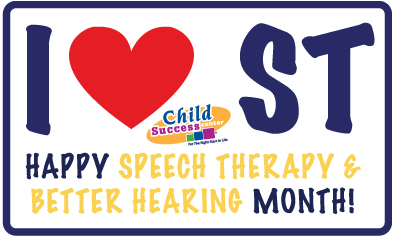
Communication is a fundamental skill that lays the foundation for how each of us will flourish and interact in society. Its importance cannot be understated, which is why every May we pay special recognition to Better Hearing and Speech Month, and the therapists that do the amazing work with our kids.
Our speech therapists shine a light on some common challenges that can affect a significant percentage of children during their key developmental years – and if left untreated, can have severe physical and psychological implications.
Speech challenges in children can exhibit overt symptoms such as delayed language development, but they also can lead to behavioral, self-esteem and de-motivational issues. Some speech challenges can be ‘grown out of,’ however, others left untreated can lead to more severe problems down the road. To better understand Speech Articulation and the therapy process, Child Success Center’s Licensed Speech Pathologists share keen insights about the potential challenges and successes – and general information – that parents want regarding ways to help their child’s specific needs in this area. Here are their responses to several essential questions surrounding these issues:
What are the greatest challenges you deal with as a therapist?
“As therapists, we are always challenged with coming up with new and creative ways to do therapy. Some children are very receptive to therapy and are very compliant. Other children demonstrate avoidance behaviors, may lack internal motivation or challenge the therapist behaviorally. It takes a special therapist to have patience, understanding, compassion and creativity to pull out the best in each child. This is the beauty of experience.”
What has been your greatest success story?
“I worked with a child years ago who was 2 years of age and had apraxia of speech – with only 10 words at the time. Most 2 year olds have 200-300 words. His father was a very involved parent, but needed a lot of guidance in understanding how to communicate with his son. He often drilled him with questions putting him on the spot, causing him to “shut down” when he talked to him. The father was very educated and successful in his career, however, I could sense that he did not feel success with being a parent due to this child’s communication deficit. After 6 months of treatment, both the child and the father, who also attended the weekly sessions, made huge gains. The father learned how to be a better communication partner with his son and the experience significantly changed the dynamics between them. With therapy a success, I formally assessed the little boy and his communication skills were above his peers. On the last day of therapy, his father cried and was so grateful. That was beyond rewarding for me!”
“Hearing a 3-year old child with a diagnosis of apraxia of speech say his nanny’s name for the first time without any help was one of the highlights for me. This child was known to simplify the words in his vocabulary to very similar and short words (mama, dada, nana, pa, ba, etc.). In (therapy), he was trying to share a story about his former nanny after Skyping with her the previous evening, and independently said his nanny’s full name. His mother began to tear up. It was that feel good moment that you want as a therapist with every client you treat.”
So parents can better understand the process, for the most common cases, what changes, other than in speech, do you observe in clients you work with?
“We can see more confidence and less frustration with most of the kids. Some children are teased by their peers because of their communication problems. I find that kids can become more confident in interacting with their peers too.”
“One of the most amazing and beautiful things that speech therapy does, is it helps children learn to be comfortable in uncomfortable situations. In therapy, you have to help kids learn new skills and sometimes they don’t want to do the work. It gives them the confidence to work through their discomfort and know that they will eventually be successful with practice.”
“Therapy is a confidence booster for parents too. Some parents are shocked by what we can get out of their kids. They can’t believe that their child is willing to do the work and be pushed at times. It gives a parent a sense of pride in their child.”
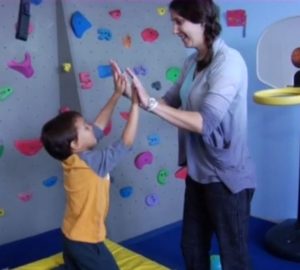 “As children progress through therapy they begin to show more confidence in their skills. We see children start to stand taller, walk taller, and use a louder, more appropriate voice when unfamiliar faces are near. However, these are also the children who teach us as therapists to “think on our toes,” or else they may use their new found skill to escape their work task.”
“As children progress through therapy they begin to show more confidence in their skills. We see children start to stand taller, walk taller, and use a louder, more appropriate voice when unfamiliar faces are near. However, these are also the children who teach us as therapists to “think on our toes,” or else they may use their new found skill to escape their work task.”
What are the most common questions parents will ask?
“Parents typically want to know how long the therapy process will take? This is always a difficult question to answer as the time varies from child to child. It may take 3 months, but it could take over a year. It depends on why the child is coming to therapy, what are the speech errors, how many errors, what type of errors, etc. There are a lot of factors to consider which makes that question one of the most difficult to answer.”
“They ask what therapy is like and how will they get their child to do the work. They also want to know what reason they should give their child for going to speech therapy. They ask if the problem will go away on its own – without therapy. They often ask if they have done something to create this problem (parents often blame themselves).”
What are the most common questions kids will ask, if any?
“Kids often want to understand why they are coming to speech therapy (especially the older ones). As they continue to come and they are in the final stages of therapy, they want to know when they will be graduating and what we do for graduation parties. They often ask about the kind of toys and games we play?”
Child Success Center is unique from other therapy facilities because it features a fully equipped and kid friendly gymnasium that the kids love to explore. How do you use the gym to help clients and why is it effective?
“The gym is a great tool to motivate kids. We sometimes use the gym as a reward in the middle or end of our sessions. It’s also great for children who are not regulated and need movement to help them feel more regulated in their bodies. Children that have high arousal levels and children who are under aroused benefit from speech work in the gym to help them stay internally organized and regulated. This helps them to attend more to the speech work and also helps motivate them. Physical movement helps jump start the communication centers in the brain.
“We see many children ranging in age from 2 years old to 12 years old. These children always enjoy knowing that they have gym time after working hard in speech. For other children, the gym is used to help the child during the speech session. These children typically benefit from the repetition of drilling for specific sounds, requesting by using language, and by utilizing the gym equipment. For these children, sitting in a chair at a desk is not the ideal situation because their body may need vestibular and proprioceptive input. When working with these children, the occupational therapists are amazing at providing tips to help improve a speech session. These tips may include providing the child with heavy work (e.g. climbing, moving pillows around) to help regulate a child or swinging in a specific manner (e.g. linear movement, spinning, etc.) and even jumping.”
More information on Better Hearing and Speech Month
More information on Speech Therapy at Child Success Center
Is Kindergarten Camp a Fit For Your Child?
Kindergarten Camp will help your child discover his love for learning!
 Kindergarten Camp is for any child that has one (1) of the following needs:
Kindergarten Camp is for any child that has one (1) of the following needs:
- Support in the transition to kindergarten
- Skills when adapting to a new environment
- Creation of meaning and enjoyment while learning
- Development of handwriting and fine motor activities
- Identification of phonological awareness and early reading processes
- Focus on academics while being at a developmental preschool
By taking an educational therapy approach and incorporating research-based programs, the Child Success Center Kindergarten Enrichment Camp offers your child a unique, summer learning experience, while having great fun in our state-of-the-art sensory motor gym in Los Angeles, California.
K-CAMP is an individualized experience, with highly trained learning specialists looking at the “whole child” while meeting the specific needs of each child. Campers will work with a learning specialist to explore their learning journey. During the K-CAMP learning adventure, each child will be helped to develop confidence when taking the first steps toward reading, writing, attending to a new routine and being socially involved. Our approach allows visual and auditory integration, providing the child with a thorough learning experience and understanding from many areas of the brain.
K-CAMP provides a balance of educational, classroom-like experiences and positive social development opportunities. Our team utilizes the hugely effective Social Thinking® (Attributed to Michelle Garcia Winner as creator of the Social Thinking Methodology) curriculum that builds the body & brain awareness that is supportive to learning exploration. Our gymnasium provides a fun, interactive and comfortable learning environment for children. With success comes the joy of seeing your child adapt to new circumstances, thrive socially, develop the necessary skills to succeed in school and learn effectively and happily.
K-CAMP will ignite your child’s learning journey whether the goal is remediation of skills and/or enrichment, all while having great summer fun!
Much of the CSC Kindergarten Camp program is based on the following areas of learning and acquisition of skills.
- Social Thinking® & Whole-Body Listening – develops skills in focusing, listening, auditory cohesion and attending to the body in group and learning situations. Addressing whole-body listening can allow the child to understand the role of their brain in an array of experiences. (this is incorporated in all learning endeavors)
- Auditory Discrimination – increases the understanding and ability to discern between the differences in sounds. Sounds make up words which make up sentences and passages. Discrimination is important in all areas of learning- reading, writing and visual/auditory integration. Understanding discrimination can often bring about comfort and confidence in the reading process.
- Auditory Memory – increases ability to develop phonemes, words and sentences and retain and recall information that is presented orally.
- Phonological Skills – evolve through learning sounds and developing phonological awareness through sound-symbol relationship, blending and segmentation, and incorporating visual, auditory and motion into the learning process.
- Handwriting – includes letter and number formation, sequencing, and development of healthy, adaptive handwriting practices.
EXPECTATIONS OF SCHOOLS
Common Core Standards have clearly upped the stakes when it comes to what skills your child will need to have in his academic and social tool belt upon entering Kindergarten. The expectations for these young children are high and include age appropriate proficiency in reading, writing, listening and collaboration. The CSC Kindergarten Camp program addresses all of these areas while maintaining a fun and stress-free environment your child will look forward to each day.
This program, including its teacher or leader, is not affiliated with, nor has it been reviewed, approved, or endorsed by Michelle Garcia Winner and Think Social Publishing, Inc.
“Social Skills” and Early Childhood Development
Social skills plays a significant role in learning development and the educational experience.
One might correctly assume that Social Thinking® (Attributed to Michelle Garcia Winner as creator of the Social Thinking Methodology) is the process by which we interpret the thoughts, beliefs, intentions, emotions, knowledge and actions of another person along with the context of a situation to understand that person’s experience or perspective, and how to react accordingly. But Social Thinking® skills also play a significant role in learning development and the educational experience.

Learning instances can provide a number of potentially challenging “social” situations – group interactions, self-regulatory expectations, knowledge of body awareness, social exchanges and an understanding of listening. By using the social thinking model, we promote growth in areas that are critical for a learning foundation and are vital to successfully managing many life endeavors and day-to-day situations.
If a child is feeling socially uneasy, struggles to verbalize and identify needs, feels disconnected within a group or has trouble self-regulating, that child may find it difficult to learn and derive meaning from learning experiences. These situations arise daily for so many children, and if social skills are left un-addressed, a child can fall further and further behind socially and academically, creating loss of self-esteem and creative potential.
We expect children to enter into a multitude of situations, some new, some routine, and our goal is for them to have the skills to thrive and find themselves successful, comfortable and confident in doing so. Social thinking development provides this opportunity for success.
Child Success Center’s Friendship Club is designed for the child, ages 5-8, who is having a difficult time navigating the social landscape of the classroom or group setting and/or building friendships. The program is designed to use a multimodal approach of positive reinforcement, flexible behavior systems, floor time aspects, mindfulness practices, and the Social Thinking®curriculum, “We Thinkers – Social Explorers™” for early learners.
This program, including its teacher or leader, is not affiliated with, nor has it been reviewed, approved, or endorsed by Michelle Garcia Winner and Think Social Publishing, Inc.
Is Your Child Struggling in School?
One in five young children are struggling in school right now. If this includes your child, early assistance can have her or him back on track this school year.
Now that we are half way through the school year and at, what should be, a steady pace for your child, this is a great time to address concerns that may have come to light regarding his or her development or learning journey. If you or your child’s teacher has growing concerns about your child’s progress at school, now is the time to seek information or get an assessment to have him or her back on track to finish the school year at their maximum potential.
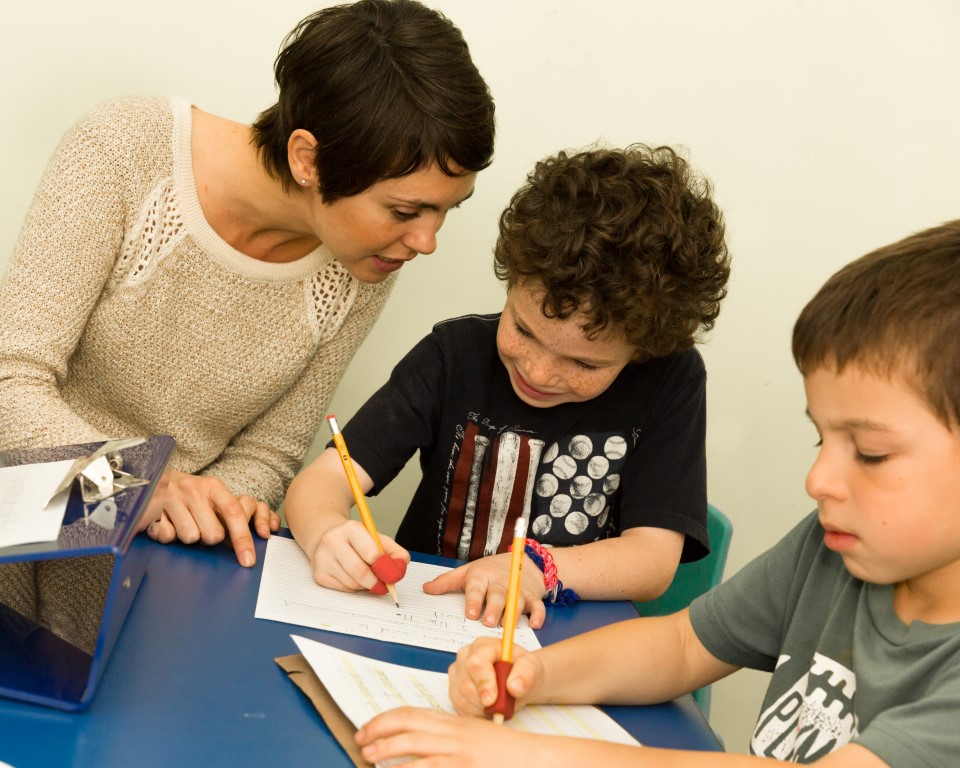 It is not uncommon for a preschool or elementary school teacher to identify challenges that your child may be experiencing at school and for you not to see those challenges at home. The school environment is a multi-sensory setting with many challenges that the home setting does not have. Children need to keep themselves calm to focus and attend to friends and teachers over a long period of time. They use their motor and language skills in a more complex manner while being challenged cognitively.
It is not uncommon for a preschool or elementary school teacher to identify challenges that your child may be experiencing at school and for you not to see those challenges at home. The school environment is a multi-sensory setting with many challenges that the home setting does not have. Children need to keep themselves calm to focus and attend to friends and teachers over a long period of time. They use their motor and language skills in a more complex manner while being challenged cognitively.
For our preschool aged children it is our role as parents to help them play and learn, and as such, we often don’t realize the amount of influence we offer to help keep them calm, happy and successful. Many times children who need a certain level of support away from home, struggle to actively engage in preschool and at times, this happens in higher grades too. Whatever the grade or age of your child, and as hard as it is listen to what your school and teachers have to say, it is valuable information that you should use in seeking additional support from either a developmental specialist (often a speech therapist and/or occupational therapist) or a tutor.
Parents and educators should take note of how well the kids in their care are progressing and look for signs and symptoms that might signal the need for some extra attention and/or educational and therapeutic support. Addressing concerns, whether they are related to learning, motor skills, speech, sensory, behavior, or development are most successfully resolved when caught early on to prevent them from becoming a much more difficult issue to treat. Additionally, when parents and teachers intervene with the right support at the right time, it is far more likely that challenges will be corrected quickly so as not to strongly impact a child’s overall educational focus, or more importantly, their self-concept and self-esteem.
For some parents, it can be very difficult to realize that their child is experiencing a challenge, but it’s important to know that ALL children develop at different rates. Therefore, it’s not uncommon for many children to need assistance of one type or another at some point during their essential growth years. The Center For Disease Control, which documents neurological and developmental disorder rates, estimates that 16.7% of children have diagnosed developmental and/or learning challenges, and further estimates that when adding those who are undiagnosed, the figure could be up to one in five children struggling with development and the learning process.
In addition to inquiring with teachers and other caregivers, observe your child closely and ask yourself key questions that may indicate a need for help. To offer a better understanding of what to look for, we’ve assembled some key questions to assist you in identifying the types of markers that can indicate a potential issue that needs attention:
- Has your preschooler experienced a stalled improvement in vocabulary or pronunciation – or has he or she developed an unusual speech pattern?
- Does your child have difficulty properly holding a pencil, using scissors or other routine instrument?
- Is your child unusually clumsy, or having trouble running, climbing or even sitting still?
- Does your preschooler have difficulty playing with other children or sharing with classmates in an age-appropriate way?
- For Kindergarten or grade school aged children: Have their writing penmanship skills plateaued and/or stopped improving in ability from earlier in the school year?
- Is your child struggling with attention and/or following directions?
- Is your child struggling with any areas of academic achievement?
- Is your child avoiding table top play that involves coloring, cutting, drawing or writing?
- Is reading overwhelming for your child and causing anxiety?
For children who need help in any of the areas noted above, parents are encouraged to confer with their child’s teacher for more insight regarding what may be going on, or what can be done to assist the child. Sometimes the parent may see things at home that a teacher does not see. Many children hold it together throughout the school day and are a different child at home. If you, as the parent see this, seek help. Sometimes the observations at school and home are the same and sometimes they are very different. If a child is stressed and struggling, get help early.
If necessary, do not hesitate to seek a qualified professional therapist who can identify the challenge and suggest a treatment or tutoring strategy that can get your child back in the “groove” before the challenge becomes a greater issue. The most important thing is to identify the problem and institute a strategy to help them glide over the speed bump as soon as possible. If you would like additional counsel, Child Success Center has a team of qualified occupational, speech/language and educational therapists who can assist in assessing any difficulties your child might be experiencing and help to keep your little one flying high for the remainder of the school year.
